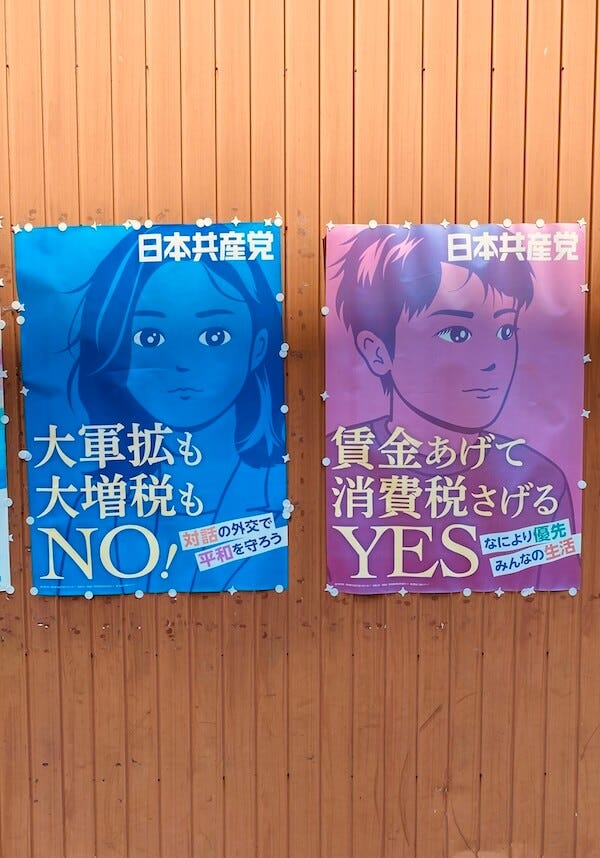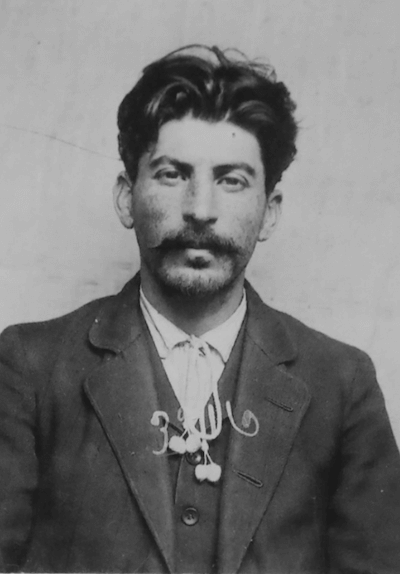⛩️ #32 How Communists Pulled Off Japan's Biggest Bank Robbery
The Headlines, This Week in Japanese History, and Much More
Today in 1932, three masked diabolicals got away with 31,700 yen from a Tokyo bank.
It was Japan’s first successful broad daylight bank robbery.
These dudes weren’t a hardened stickup crew though — they were Communists heisting for the Revolution.
Today’s feature story examines this robbery — the so-called “Red Gang Incident” — plus we’ve also got your usual quiz, links and more.
Let’s drill into it:
THE QUIZ
A picture any Japanese person will recognize instantly — do you?
Question: what are these two up to?
Answer at the foot of the mail.
THE HISTORY
How Communists Pulled Off Tokyo's Biggest Bank Robbery
Election posters for the Japanese Communist Party, 2024. Image: The Kyote
There have been some very handy Communist bank robbers over the years.
Turns out if you view the state as the enemy and switch the word “theft” for “expropriation”, there’s nothing more a Marxist likes than running-and-gunning like they’re auditioning to replace Waingro in Neil McCauley’s crew.
Some favorite Red jobs of ours over the years are the $7.2m robbery of a Wells Fargo depot in Connecticut by the Puerto Rican FALN, and the 1907 Tiflis bank robbery that netted the Bolsheviks 241,000 rubles — and was masterminded by a squat Georgian nicknamed Koba, later to become famous under new nickname J. Stalin (they killed 40 people to get the Tiflis dough, showing that even then Stalin was at best a rough diamond…)
But the strongarm job we’re interested in today happened at 4 in the afternoon, October 6, 1932.
The Omori branch of Kawasaki Daihyaku Bank in Tokyo. Half a dozen employees moon listlessly around, looking forward to knocking off for the day.
Suddenly, via the back door: three masked-up dudes boogie in holding guns, blast a couple of attention-getters into the floor, then lock the bank employees in a back room and take 31,700 yen cash from the vault.
They unboogie from the bank and hit the getaway cars — and despite the cops quickly mobilizing, off the thieves disappear without trace into the busy streets of Tokyo.
It’s Japan’s first successful bank robbery — and the resemblance to the kind of cowboy score happening in the streets of Al Capone’s Chicago is no coincidence…
It was a Japanese Communist Party job. Desperately low on much-needed violent revolution funds, a party leader named Mitsunobu Iizuka set up the deliciously euphemistic Housing Finance Bureau — and a couple of apparatchiks called Zenichi Imaizumi and Yushō Ōtsuka started brainstorming ideas to generate quick cash. What they came up with: some doozies like blackmail, fraud, honey traps, porno photo sales — oh, plus strongarm jobs.
Ōtsuka in particular harvested tips from a close reading of books about America’s rampant crime wave, and seemed to be particularly into the theatrical trappings of the job — he was first through the bank door — the masks, the warning shots — plus the way he got his getaway car through the police corden by having a couple of floozies in the vehicle with him, including one of the daughters of the mayor of Kyoto.1
* * *
Getting away with it?
Communist bank robbers also have a proud history of getting away with it.
The Puerto Rican FALNers successfully moved the entire $7.2m they stole from Wells Fargo in 1983 — $2m made its way to Cuba, $4m into various safe deposit boxes, and they spent a cool million themselves.2
Okay, so a couple of them did got locked up, but not long afterwards President Clinton commuted their sentences.3
Mugshot of Koba, early bandit alias of J. Stalin. Image: Wikipedia
And, needless to say, Koba AKA J. Stalin didn’t do too badly from the Tiflis stickup, although co-conspirator Kamo was locked in a room with comfortable walls for three years while feigning insanity before he could escape. (Lenin came up with a madcap scheme to exchange the easily-traceable 500 ruble notes simultaneously at banks across Europe, which turned out to be a dud — the cash was eventually burned).
So, did our Red Gang get away with the Omori bank job?
Yeah, not at all — they got rounded up less than 72 hours later.
Here’s what happened:
Shortly after the robbery, investigators from Ushigome Kagurazaka Police Station were grilling a gambler on an unrelated matter when he gave up a gun dealer for waving a pistol in his mug.
When that gun dealer was locked in a room with some “motivated” cops, looking to help himself he confessed he had previously sold 25 handguns to a “Saito”, who was shortly to return to pick up six more pieces plus 600 rounds of live ammunition. Naturally the cops sat on the meeting place and picked up Saito…
…who displayed total brass balls, refusing to talk — until the cops noticed he was carrying two 10-yen notes whose serial numbers matched the batch of stolen cash from the bank.
With a little “persuasion”, of the type which tends to leave a mark, Saito confessed to being an employee of the Japanese Communist Party's Finance Bureau — plus partially responsible for planning the robbery.4
The rest was easy. Masterminds Zenichi Imaizumi and Yushō Ōtsuka plus 13 others were quickly grabbed up.
The Japanese Communist Party weathered some bad publicity.
Imaizumi was charged with violating the Peace Preservation Law. Prosecutors wanted 15 years. He got 13.
Ōtsuka got 10.
However, the story the cops kited, gun dealer leads them to Saito etc. etc., turned out to be bullsh*it — to protect their guy on the inside.
Unfortunately for big brain Imaizumi and creative lead Ōtsuka, the entire operation was known to the Special Higher Police from the beginning — because Masanobu Iizuka, the very head of the Housing Finance Bureau, had long since been turned and was acting as high-level rat-in-situ for the cops.
In fact, all the Housing Finance Bureau crimes — blackmail, porno pix and even the Omori bank job itself, were all captive operations, monitored from jump by the police via Iizuka tip-offs.
Ōtsuka went into the bank cosplaying John Dillinger, not knowing he was just performing a part, directed by the cops, to put himself and half the Communist party safely under lock-and-key (pity the poor bank employees, unwitting extras in a very dangerous game).
Spoiler: the cops’ plan worked. There was no Communist revolution in Japan.
Postscript:
While Comrade Koba wouldn’t be the first person we’d recommend patterning your life choices after, he would never have allowed himself to be moved around like a two-bit hood via the machinations of a police spy — instead by all accounts he was the one playing both sides, letting the Okhrana know just enough to cover his own backside, while making sure his robbery went off just the way he planned it.
* * *
Also this week in post-war Japanese history…
1992: Man throws smoke bomb at Emperor Akihito; Empress Michiko (the first ever non-aristocratic empress) throws herself in harm’s way like the Secret Service, endearing herself to the whole nation
1995: Anime Neon Genesis Evangelion debuts. Decades later, theme tune A Cruel Angel’s Thesis remains a karaoke perennial
2000: an acronym affectionado’s ultimate avalon as companies DDI, KDD, and IDO merge to form telecommunications giant KDDI
Get The Kyote fresh off the presses, directly to your inbox:
THE LANGUAGE
5 English Words with Different Meanings in Japanese
Lost in translation, or gained? That’s the phenomenon of wasei eigo, Japanese-created terms that often bear little relation to how English speakers use their native language. Here are a few of our favorites:
1️⃣ UFO Catcher (UFOキャッチャー)
Means: Claw machine (arcade game)
The first patented claw machine game was called the Erie Digger, and was inspired by the machinery used in the creation of the Erie Canal.
In Japan, the claw part was thought to resemble your stereotypical UFO, and thus the UFO Catcher was named — and became obligatory for teenaged Japanese boys trying to show off to their dates.
2️⃣ Viking (バイキング)
In Japan, a Viking is not a seafaring Norse badass so muscled they wouldn’t notice if hit by a bus; instead it refers to a all-you-can-eat buffet-style meal. Why?
It’s all thanks to Tokyo’s Imperial Hotel, who 60 years ago sent their chef across Europe to find a dining concept to steal. In Denmark he saw an all-you-can-eat buffet — and the 1958 Kirk Douglas swashbuckler Vikings doing gangbusters in movie theaters — thus was the Viking born (P.S., in Japanese it’s pronounced Biking, just to confuse things ever further).
3️⃣ Celeb (セレブ)
Celeb is short for “celebrity” — they mean the same thing.
Now welcome to Japan — where a “celeb” instead is someone with a luxury, flauntable lifestyle (usually on social media), but not necessarily famous.
Sample confusing conversation from personal experience:
“I have a few celeb friends.”
“Oh cool, what are they famous for?”
“They’re not.”
“…okay.”
4️⃣ My pace (マイペース)
“My” in Japan doesn’t mean “my”.
“My Home” doesn’t mean my home, it means the concept of owning one’s own home.
“My car” doesn’t mean my car, it means owning a car.
Hence unnatural expressions like “No My Car Day”, as in leave your car at home day.
Leading us to “my pace”: someone who acts at their own speed or does things their own way, often with the connotation of not caring what other people think.
Sample conversation: “you can’t hurry Tanaka-San — he’s my pace!”
5️⃣ High touch (ハイタッチ)
AKA giving someone a “high five”. First documented in 1977 (!), and of course appropriated from black culture. Anyway, in our opinion high touch is a perfectly (even more) reasonable name for the high five (not that we’d ever be caught doing it…)
THE LINKS
3 things worth your time about Japan:
Hiroko Yoda takes a spoiler-free look at Shogun's cultural details (it helps they had an astronomical $$$ budget)
Bill Alder with some prime Stray Cats of Kyoto pics
Letters From Japan’s One Year Anniversary Post, with Burcu’s typically wonderful photos
THE ANSWER
Question: what are these two up to?
Answer: Pocky is a thin chocolate-covered biscuit stick. The Pocky Game is a Lady and the Tramp-style excuse to get close to (and hopefully) kiss someone: one end in each mouth and it’s a race to the middle.
Enjoy The Kyote this time? Check this out next: A Doomsday Cult Tried Rescuing a Lost Seal
We’ll see each other again next week,
The Kyote
Comment? Just Hit Reply
The Kyote is published in Kyoto, Japan every Sunday at 19:00 JST
https://ja.wikipedia.org/wiki/%E8%B5%A4%E8%89%B2%E3%82%AE%E3%83%A3%E3%83%B3%E3%82%B0%E4%BA%8B%E4%BB%B6#%E9%8A%80%E8%A1%8C%E5%BC%B7%E7%9B%97%E8%A8%88%E7%94%BB
https://en.wikipedia.org/wiki/%C3%81guila_Blanca_(heist)
https://en.wikipedia.org/wiki/%C3%81guila_Blanca_(heist)
https://ja.wikipedia.org/wiki/%E8%B5%A4%E8%89%B2%E3%82%AE%E3%83%A3%E3%83%B3%E3%82%B0%E4%BA%8B%E4%BB%B6#%E4%BA%8B%E4%BB%B6%E3%81%AE%E6%A6%82%E8%A6%81













